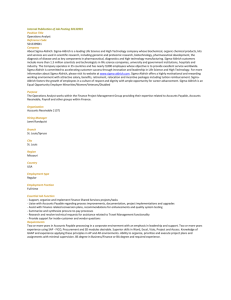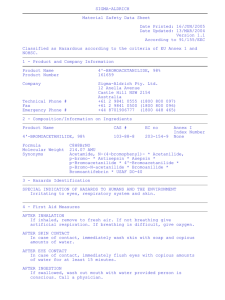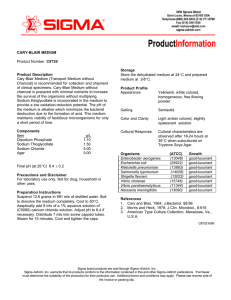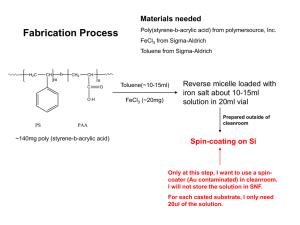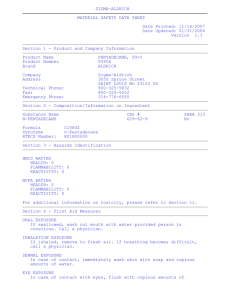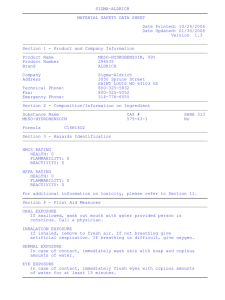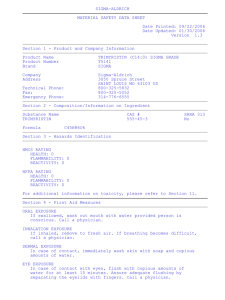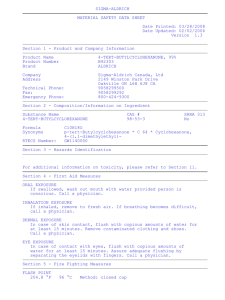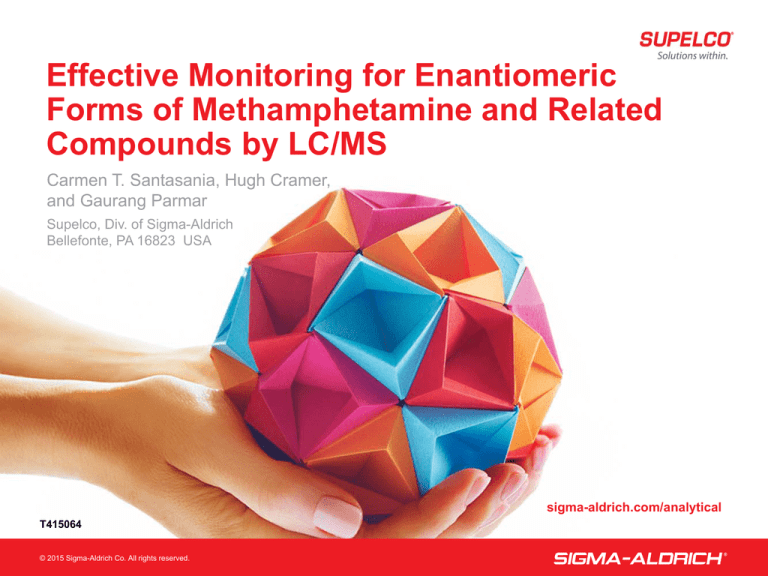
Effective Monitoring for Enantiomeric
Forms of Methamphetamine and Related
Compounds by LC/MS
Carmen T. Santasania, Hugh Cramer,
and Gaurang Parmar
Supelco, Div. of Sigma-Aldrich
Bellefonte, PA 16823 USA
sigma-aldrich.com/analytical
T415064
© 2015 Sigma-Aldrich Co. All rights reserved.
Introduction
• Methamphetamine is a controlled substance (Class A in Europe and
Schedule II in the USA). The R-isomer (levo) is used legally in several over
the counter medicines (e.g., Vicks® Vapoinhaler) and so, can alter the true
level arising from drug abuse.
• The S-isomer (dextro) of methamphetamine is the illicit simulant often
abused for recreational purposes.
• Analysis is further complicated by the fact that R-methamphetamine is also a
metabolite of certain therapeutic drugs such as selegiline, a compound used
in the treatment of Parkinson's disease, depression and dementia.
• Immunoassay does not differentiate between the legal and illicit versions and
therefore will report a positive finding if either are detected in the sample
above cutoff concentrations. The same holds true for reversed-phase LC-MS
techniques that are commonly used in toxicology for drugs of abuse
quantitation.
2
© 2015 Sigma-Aldrich Co. All rights reserved.
Introduction (contd.)
• The presented work describes the chromatographic screening procedure
used on urine samples for methamphetamine. Sample recoveries and
detection limits for the method are provided.
• The same method was also used to determine enantiomers of
amphetamine in urine.
3
© 2015 Sigma-Aldrich Co. All rights reserved.
Experimental
Figure 1. Compounds Used in this Study
CH3
NH
CH 3
CH 3
NH
S(+) Methamphetamine (dextro)
CH 3
R(-) Methamphetamine (levo)
4
© 2015 Sigma-Aldrich Co. All rights reserved.
LC Conditions Experiments-Optimum Mobile Phase
Initially, a study was undertaken to investigate the chromatographic results of
different buffer additives for the chiral analysis of (+/-)-methamphetamine using
a CHIROBIOTIC® V2 column.
In this experiment, two different mobile phases were evaluated based on
previously reported work (1).
Buffer additives in 95:5, methanol:water
– 0.1% acetic acid, 0.02% ammonium hydroxide
– 0.05% ammonium trifluoroacetate
5
© 2015 Sigma-Aldrich Co. All rights reserved.
Results and Discussion
• Figure 2 shows two LC conditions for the separation. Both conditions provide
baseline resolution of the enantiomers.
• The acetic acid/ammonium hydroxide mobile phase provides more retention
and more resolution (resolution = 2.0) of the compounds as shown in Figure
2. Ammonium trifluoroacetate (ATFA) provides less retention and resolution
(resolution = 1.7).
• ATFA is also less amenable to MS as it tends to precipitate over time,
leading to a drift in retention time.
• There is an improved response as indicated by the greater signal to noise
ratio, (50 vs 25) for the hydroxide vs ATFA, respectively).
• Therefore, the acetic acid/ammonium hydroxide mobile phase was used for
the remainder of the study.
• The final optimized method conditions are presented in Figure 3.
6
© 2015 Sigma-Aldrich Co. All rights reserved.
Figure 2. Chromatograms to Determine Optimum
1
Mobile Phase Conditions
2
0.10% acetic acid
0.02% ammonium hydroxide
resolution = 2.0
s/n = 50
0
1. S(+)-Methamphetamine 50 ng/mL
2. R(-)-Methamphetamine 50 ng/mL
2
4
Time (min)
6
8
1
2
0.05% ammonium trifluoroacetate
resolution = 1.7
s/n = 25
0
© 2015 Sigma-Aldrich Co. All rights reserved.
2
4
Time (min)
6
8
7
Figure 3. LC Chromatogram Using Optimum Conditions
column:
mobile phase:
flow rate:
pressure:
temp.:
det.:
CHIROBIOTIC V2, 15 cm x 4.6 mm, 5 µm particle size (15023AST)
95:5:0.1:0.02, methanol:water:acetic acid:ammonium hydroxide
1.0 mL/min
1220 psi, 84 bar
20 ºC
MS,SIR m/z 150.1
injection: 2 µL
1
sample: 1. S(+)-Methamphetamine, 50 ng/mL
2. R(-)-Methamphetamine, 50 ng/mL
2
instrument: Waters Acquity QDa
0
2
4
Time (min)
6
8
8
© 2015 Sigma-Aldrich Co. All rights reserved.
Figure 4 shows a curve for S(+)-Methamphetamine standard demonstrating a
linear response in concentration, with a range of 5-250 ng/mL, (R2=0.9992).
The limit of quantitation (LOQ) was determined to be less than 12.5 ng/mL,
using a simple single quadrapole mass spectrometer.
9
© 2015 Sigma-Aldrich Co. All rights reserved.
Figure 4. Calibration Curve and Determination of LOQ,
S (+)-Methamphetamine Standard, Range= 5-250 ng/mL
R^2
0.9992
Standard Error
4.88E+04
Equation
Y = 4.24e+004 X – 1.10e+004
LOQ determined to be less than 12.5 ng/mL of
each enantiomer where s/n=15.
ng/mL
10
© 2015 Sigma-Aldrich Co. All rights reserved.
Sample cleanup was initially done with a liquid/liquid extraction of a urine
sample. The results yielded poor recovery (~66 %) of the (+)methamphetamine.
Based on prior experience, a generic sample preparation method was then used
and is detailed below.
11
© 2015 Sigma-Aldrich Co. All rights reserved.
Generic Extraction Conditions
matrix: 1 mL of synthetic urine spiked with 50 ng/mL of each enantiomer,
acidified to pH 3-4 with formic acid
SPE well plate: Supel™ Select SCX SPE 96-well Plate, 30 mg/well (575664-U)
conditioning: 1 mL 1% formic acid in acetonitrile, then 1 mL water
sample addition: 1.0 mL urine sample
washing: 2 mL water, then 1 mL 25% methanol
elution: 1 mL 10% ammonium hydroxide in acetonitrile
eluate post-treatment: evaporate to dryness under nitrogen at 40 ºC, reconstitute in 1 mL
mobile phase
12
© 2015 Sigma-Aldrich Co. All rights reserved.
Figure 5 shows an overlay of a urine blank and a 25 ng/mL spiked sample
extraction on the same y scale indicating a good sample cleanup procedure.
Note the small shoulder on peak 1 in the spiked extraction sample. This peak
was not observed in the standards but is detected in the urine blanks.
Removal of this small interference is likely possible through improved
extraction procedures or possibly by MS/MS for detection.
As shown in Table 1, suitable recoveries for both enantiomers were observed
at the 25 ng/mL level; 82% and 72% for S and R, respectively.
13
© 2015 Sigma-Aldrich Co. All rights reserved.
Figure 5. Overlay Urine Blank and Spiked Sample,
same scale, (25 ng/mL)
1
2
Urine Blank
0
2
4
Time (min)
6
8
14
© 2015 Sigma-Aldrich Co. All rights reserved.
Table 1. Recovery (+/-)-Methamphetamine Using
Supel Select SCX
Spike (ng/mL)
Average Recovery
n=3
% Recovery
S-(+)-Methamphetamine
25
20.7
82.8%
R-(-)-Methamphetamine
25
18.2
72.7%
15
© 2015 Sigma-Aldrich Co. All rights reserved.
In applying the same chromatographic conditions and extraction procedures to
a related compound, a separation of the enantiomeric forms of amphetamine is
shown in Figure 6.
Baseline resolution of the two enantiomers is observed without any interfering
peaks. However, a large peak is detected in the chromatogram that has been
identified as the sodium adduct of creatinine (peak 1) (m/z136). An additional
washing step in the extraction procedure using ammonium phosphate, pH 8,
resulted in significant removal of the creatinine response (data not shown).
16
© 2015 Sigma-Aldrich Co. All rights reserved.
Figure 6 . Enantiomeric Forms of Amphetamine
Extracted from Urine (50 ng/mL)
1
1. Na+ adduct of Creatinine
2. S(+)-Amphetamine
3. R(-)-Amphetamine
2
3
0
2
4
Time (min)
6
8
17
© 2015 Sigma-Aldrich Co. All rights reserved.
Conclusions
A method for the determination of enantiomeric forms of methamphetamine
and amphetamine from urine was developed. The choice of acetic acid and
ammonium hydroxide as additives provided improved LOQ and suitable
resolution. Sample preparation was shown to be optimal using SCX SPE
material, although an additional wash step would be desirable to remove a low
level interferent. Good linearity and recovery were demonstrated for
methamphetamine after urine extraction.
The method is shown to be suitable for the differentiation of illicit and legal
presence of methamphetamine in urine.
18
© 2015 Sigma-Aldrich Co. All rights reserved.
Reference
1. http://www.sigmaaldrich.com/technicaldocuments/articles/analytical/bioanalytical/chiral-lcmsmethamphetamine.html – Reporter 31.2, Pages 24-25, 2013.
Trademarks
CHIROBIOTIC is a registered trademark of Sigma-Aldrich Co. LLC.
Vicks is a registered trademark of The Procter & Gamble Company.
19
© 2015 Sigma-Aldrich Co. All rights reserved.

